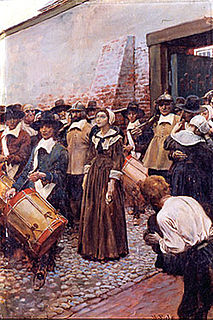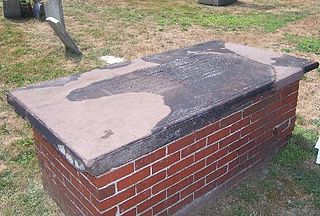
The Cavalier Parliament of England lasted from 8 May 1661 until 24 January 1679. It was the longest English Parliament, and longer than any Great British or UK Parliament to date, enduring for nearly 18 years of the quarter-century reign of Charles II of England. Like its predecessor, the Convention Parliament, it was overwhelmingly Royalist and is also known as the Pensioner Parliament for the many pensions it granted to adherents of the King.
Richard Bellingham was a colonial magistrate, lawyer, and several-time governor of the Massachusetts Bay Colony, and the last surviving signatory of the colonial charter at his death. A wealthy lawyer in Lincolnshire prior to his departure for the New World in 1634, he was a liberal political opponent of the moderate John Winthrop, arguing for expansive views on suffrage and lawmaking, but also religiously somewhat conservative, opposing the efforts of Quakers and Baptists to settle in the colony. He was one of the architects of the Massachusetts Body of Liberties, a document embodying many sentiments also found in the United States Bill of Rights.

English Tangier was the period in Moroccan history when the city of Tangier was occupied by England as part of the English colonial empire from 1661 to 1684. Tangier had been under Portuguese control before King Charles II acquired the city as part of the dowry when he married the Portuguese infanta Catherine. The marriage treaty was an extensive renewal of the Anglo-Portuguese Alliance; it was opposed by Spain but clandestinely supported by France.

Mary Dyer was an English and colonial American Puritan turned Quaker who was hanged in Boston, Massachusetts Bay Colony, for repeatedly defying a Puritan law banning Quakers from the colony. She is one of the four executed Quakers known as the Boston martyrs.

Margaret Fell or Margaret Fox was a founder of the Religious Society of Friends. Known popularly as the "mother of Quakerism," she is considered one of the Valiant Sixty early Quaker preachers and missionaries. Her daughters Isabel (Fell) Yeamans and Sarah Fell were also leading Quakers.

Charles Stewart, 3rd Duke of Richmond, 6th Duke of Lennox KG of Cobham Hall in Kent and of Richmond House in Whitehall, London, 11th Seigneur d'Aubigny in France, was an English nobleman of Franco-Scottish ancestry and a 4th cousin of King Charles II of England, both being descended in the male line from John Stewart, 3rd Earl of Lennox.
Elizabeth Hooton was an English Dissenter and one of the earliest preachers in the Religious Society of Friends, also known as the Quakers. She was born in Nottingham, England. She was beaten and imprisoned for propagating her beliefs; she was the first woman to become a Quaker minister. She is considered one of the Valiant Sixty, a group of celebrated Friends preachers. Her surname is sometimes spelled Hooten.
Christopher Holder (1631–1688), was an early Quaker evangelist who was imprisoned and whipped, had an ear cut off, and was threatened with death for his religious activism in the Massachusetts Bay Colony and in England. A native of Gloucestershire, near Bristol in western England, Holder became an early convert to the Society of Friends, and in 1656, at the age of 25, made his first voyage to New England aboard the Speedwell to spread his Quaker message. All of the Quakers in his group were imprisoned, and then sent back to England on the same ship. Undeterred, Holder returned to New England aboard the small barque Woodhouse, landing in New Amsterdam in August 1657 despite few predictions of success. Though young, he was a leader among the eleven Quaker missionaries that fanned out among the American colonies. Holder, with his frequent companion John Copeland, went north to the Massachusetts Bay Colony to begin their evangelistic efforts in the face of increasingly threatening anti-Quaker laws. With little success on Martha's Vineyard, they moved to Cape Cod where they were warmly received in Sandwich, establishing the earliest Quaker meeting in America.

Benedict Arnold was president and then governor of the Colony of Rhode Island and Providence Plantations, serving for a total of 11 years in these roles. He was born and raised in the town of Ilchester, Somerset, England, likely attending school in Limington nearby. In 1635 at age 19, he accompanied his parents, siblings, and other family members on a voyage from England to New England where they first settled in Hingham in the Massachusetts Bay Colony. In less than a year, they moved to Providence Plantation at the head of the Narragansett Bay at the request of Roger Williams. In about 1638, they moved once again about five miles (8 km) south to the Pawtuxet River, settling on the north side at a place commonly called Pawtuxet. Here they had serious disputes with their neighbors, particularly Samuel Gorton, and they put themselves and their lands under the jurisdiction of Massachusetts, a situation which lasted for 16 years.
Richard Towneley was an English mathematician, natural philosopher and astronomer, resident at Towneley Hall, near Burnley in Lancashire. His uncle was the antiquarian and mathematician Christopher Towneley (1604-1674).
Laurence Womock (1612–1686) was an English bishop. He is best known for his controversial writings, some of which were signed Tilenus, after Daniel Tilenus, expressing his hostility to Calvinism in general, and the Synod of Dort in particular.
William Caton (1636–1665) was an early English Quaker itinerant preacher and writer.

Richard Gilpin M.D. (1625–1700) was an English nonconformist minister and physician, prominent in the northern region.

The Restoration of the monarchy began in 1660. The Commonwealth of England, Scotland and Ireland (1649–60) resulted from the Wars of the Three Kingdoms but collapsed in 1659. Politicians such as General Monck tried to ensure a peaceful transition of government from the "Commonwealth" republic back to monarchy. From 1 May 1660 the English, Scottish and Irish monarchies were all restored under King Charles II. The term Restoration may apply both to the actual event by which the monarchy was restored, and to the period immediately before and after the event.

Major-General Humphrey Atherton,, an early settler of Dorchester, Massachusetts, held the highest military rank in colonial New England. He first appeared in the records of Dorchester on March 18, 1637 and made freeman May 2, 1638. He became a representative in the General Court in 1638 and 1639–41. In 1653, he was Speaker of the House, representing Springfield, Massachusetts. He was chosen assistant governor, a member of the lower house of the General Court who also served as magistrate in the judiciary of colonial government, in 1654, and remained as such until his death." He was a member of the Ancient and Honorable Artillery Company of Massachusetts and held the ranks of lieutenant and captain for several years before rising to the rank of major-general. He also organized the first militia in Massachusetts.
Leonard Fell, was an English Quaker.
Wenlock Christison was the last person to be sentenced to death in the Massachusetts Bay Colony for being a Quaker. Four people had previously been executed in Massachusetts for this reason. However, Christison was not executed. He left Massachusetts and lived the remainder of his life in Talbot County, Maryland.
General James Cudworth was one of the most important men in Plymouth Colony. He served as Deputy to the Plymouth General Court (1649), Commander of militia in King Philip's War (1675–8), Assistant Governor and Deputy Governor (1681–2) of Plymouth Colony, and Commissioner to the New England Confederation.
Martin Lluelyn (1616–1682) was a poet and physician of probable Welsh ancestry.
Humphrey Cornewall (1616–1688) was an English member of parliament.








